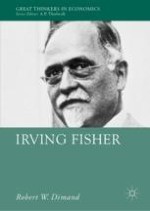2019 | OriginalPaper | Buchkapitel
9. Changing Economics: Irving Fisher, the Cowles Commission, and the Econometric Society
verfasst von : Robert W. Dimand
Erschienen in: Irving Fisher
Aktivieren Sie unsere intelligente Suche, um passende Fachinhalte oder Patente zu finden.
Wählen Sie Textabschnitte aus um mit Künstlicher Intelligenz passenden Patente zu finden. powered by
Markieren Sie Textabschnitte, um KI-gestützt weitere passende Inhalte zu finden. powered by
